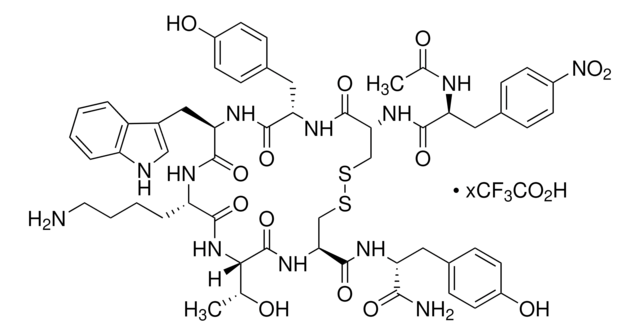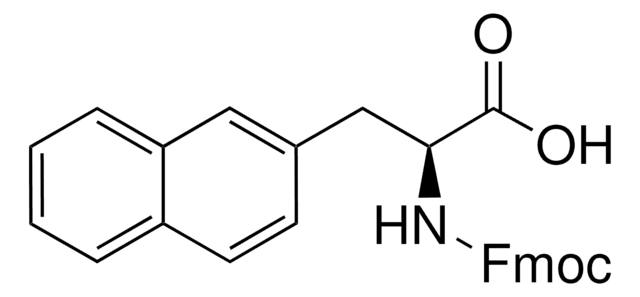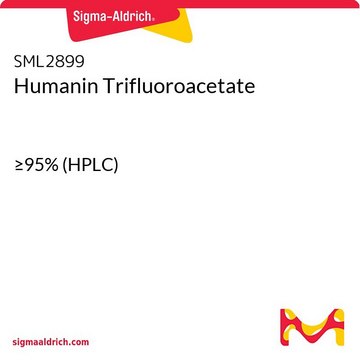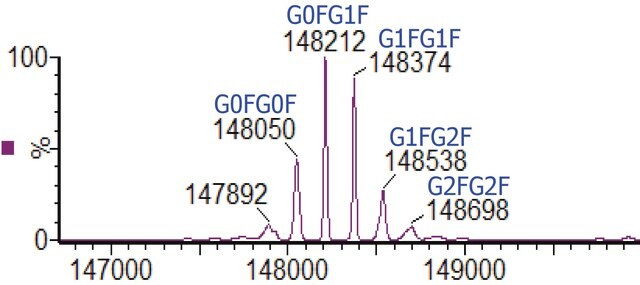B4310
BIM 23056
≥95% (HPLC), solid
Synonym(s):
D-Phe-Phe-Tyr-D-Trp-Lys-VaL-Phe-D-Nal-NH2 trifluoroacetate salt
Sign Into View Organizational & Contract Pricing
All Photos(1)
About This Item
Empirical Formula (Hill Notation):
C71H82N11O9 · xC2HF3O2
Molecular Weight:
1233.48 (free base basis)
UNSPSC Code:
12352200
NACRES:
NA.77
Recommended Products
Quality Level
Assay
≥95% (HPLC)
form
solid
color
white
solubility
H2O: >1 mg/mL
shipped in
wet ice
storage temp.
−20°C
Gene Information
human ... SSTR5(6755)
mouse ... SSTR5(20609)
rat ... SSTR5(25354)
Amino Acid Sequence
Phe-Phe-Tyr-Trp-Lys-Val-Phe-Nal-NH2
Biochem/physiol Actions
Selective sst5 somatostatin receptor antagonist.
Storage Class Code
11 - Combustible Solids
WGK
WGK 3
Flash Point(F)
Not applicable
Flash Point(C)
Not applicable
Personal Protective Equipment
dust mask type N95 (US), Eyeshields, Gloves
Choose from one of the most recent versions:
Certificates of Analysis (COA)
Lot/Batch Number
Don't see the Right Version?
If you require a particular version, you can look up a specific certificate by the Lot or Batch number.
Already Own This Product?
Find documentation for the products that you have recently purchased in the Document Library.
G F Wilkinson et al.
British journal of pharmacology, 118(3), 445-447 (1996-06-01)
We have investigated the effects of somatostatin (SRIF) and the linear octapeptide BIM-23056 on changes in intracellular calcium ion concentration ([Ca2+]i) and on the formation of inositol-1,4,5-trisphosphate (Ins(1,4,5)P3) in CHO-K1 cells transfected with the human recombinant SRIF sst5 receptor. SRIF
Caroline Nunn et al.
European journal of pharmacology, 436(3), 173-186 (2002-02-23)
Somatostatin (somatotropin release inhibiting factor, SRIF), exerts its effects via specific G protein coupled receptors of which five subtypes have been cloned (sst1-5). Recently, SRIF receptors have also been cloned from fish tissues. In this study, goldfish sst5 receptors (gfsst5)
Daniel G Blackmore et al.
iScience, 24(11), 103275-103275 (2021-11-12)
Hippocampal function is critical for spatial and contextual learning, and its decline with age contributes to cognitive impairment. Exercise can improve hippocampal function, however, the amount of exercise and mechanisms mediating improvement remain largely unknown. Here, we show exercise reverses
Our team of scientists has experience in all areas of research including Life Science, Material Science, Chemical Synthesis, Chromatography, Analytical and many others.
Contact Technical Service








